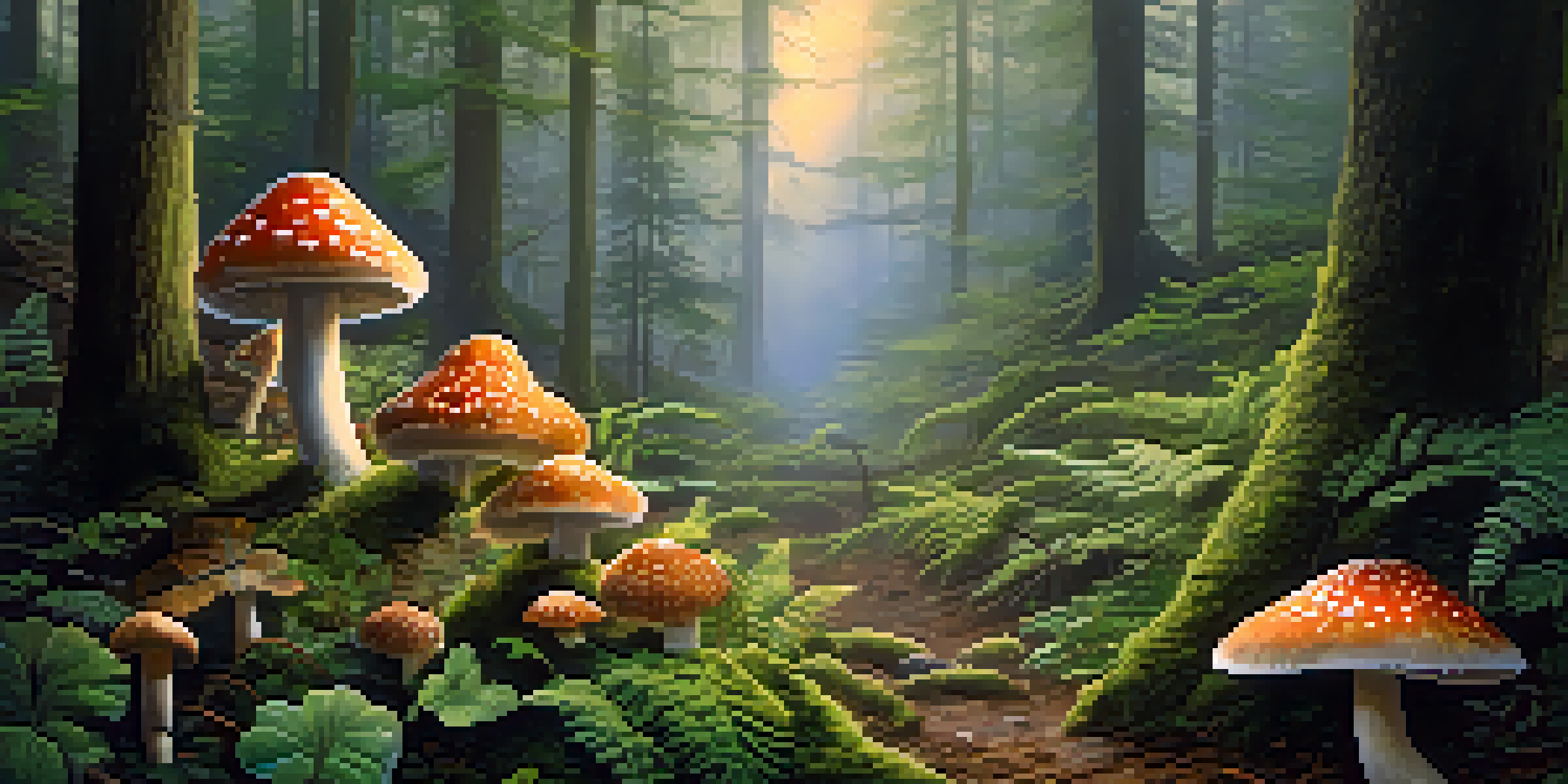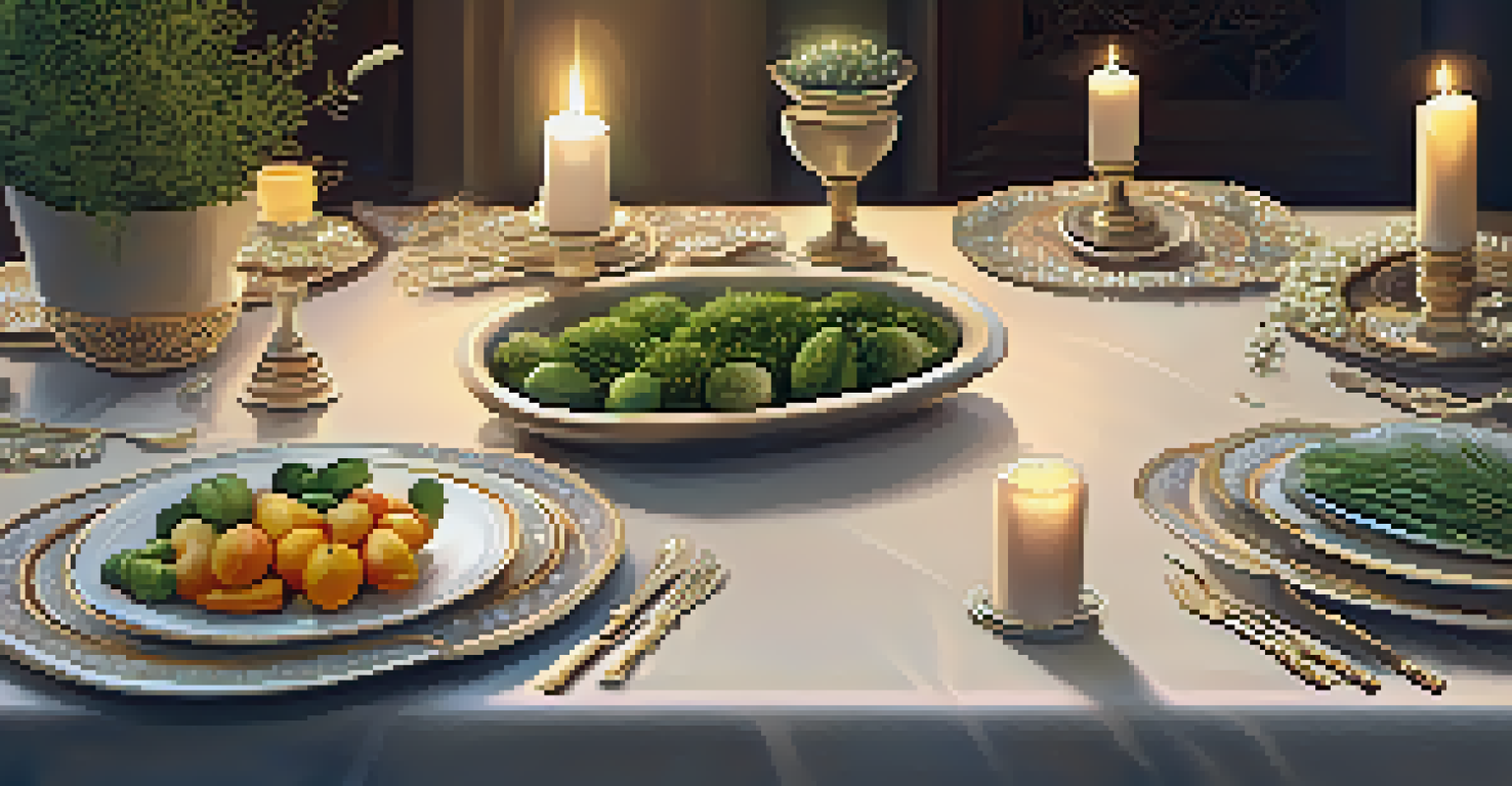Entheogens: Bridging Science and Spiritual Mysticism

Understanding Entheogens: Nature's Psychedelic Gifts
Entheogens are substances that are often derived from plants and fungi, used in various cultures for spiritual and religious purposes. These compounds can induce altered states of consciousness, allowing individuals to experience profound insights and connections. Common examples include psilocybin from mushrooms and mescaline from cacti, each with rich historical significance.
Psychedelics are a catalyst for change, helping us to see the world in new ways and understand ourselves more deeply.
The term 'entheogen' itself means 'generating the divine within,' highlighting their role in spiritual exploration. Many indigenous cultures have long utilized these substances during rituals, believing they can facilitate communication with the divine or the spirit world. This deep-rooted connection to spirituality sets entheogens apart from other psychoactive substances.
In recent years, there has been a resurgence of interest in entheogens, not only in spiritual circles but also within scientific research. Studies are beginning to highlight their potential therapeutic benefits, particularly in treating conditions like depression and PTSD. This combination of ancient wisdom and modern science creates a fascinating dialogue about the role of entheogens in our lives.
The Science Behind Entheogens: A Complex Interaction
At the heart of understanding entheogens lies the science of how they interact with the brain. Many of these substances affect neurotransmitter systems, particularly serotonin, which plays a key role in mood regulation and perception. This biochemical dance can lead to altered perceptions of reality, often described as mystical experiences.

Research has shown that these experiences can be beneficial, leading to lasting changes in attitudes and behaviors. For instance, individuals who participate in guided psilocybin sessions often report increased feelings of connection and empathy. This aligns with findings that suggest entheogens can help expand consciousness and enhance cognitive flexibility.
Entheogens: Pathways to Spirituality
Entheogens have been used for centuries in various cultures to facilitate spiritual exploration and connection with the divine.
However, it’s essential to approach this subject with caution. While the science is promising, the experiences induced by entheogens can also be unpredictable. Proper set (mindset) and setting (environment) are crucial for a positive experience, emphasizing the need for responsible use and respect for these powerful substances.
Historical Context: Entheogens Through the Ages
Historically, entheogens have played a significant role in various cultures worldwide. From the ancient rituals of the Aztecs using peyote to the spiritual ceremonies of Amazonian tribes with ayahuasca, these substances have been integral to understanding the divine. They were often considered sacred tools for healing and divination.
The experience of unity with the universe is the most profound and transformative experience a human being can have.
In many indigenous traditions, the use of entheogens was not merely recreational but served as a bridge to the spiritual realm. Elders and shamans would guide participants through these experiences, ensuring they were meaningful and transformative. This respect for the substances and their effects contrasts sharply with the contemporary recreational use seen in some societies.
Today, as we rediscover these ancient practices, there's a growing movement to integrate traditional knowledge with modern scientific inquiry. This historical context enriches our understanding of entheogens, encouraging a more respectful and informed approach to their use in contemporary society.
Modern Applications: Therapeutic Uses of Entheogens
In recent years, the therapeutic potential of entheogens has sparked significant interest within the medical community. Research institutions have begun exploring how substances like psilocybin and MDMA can aid in treating mental health disorders, particularly where traditional therapies fall short. Preliminary results have shown promise in reducing symptoms of anxiety, depression, and PTSD.
For instance, clinical trials using psilocybin for depression have indicated that patients often experience profound shifts in perspective, leading to sustained improvements in mood and well-being. These findings suggest that entheogens could serve as powerful adjuncts in psychotherapy, providing new avenues for healing.
Therapeutic Potential of Entheogens
Recent research indicates that substances like psilocybin may offer significant benefits in treating mental health disorders such as depression and PTSD.
However, it’s vital to approach this emerging field with care. The therapeutic use of entheogens should be conducted in controlled settings, guided by professionals. This ensures that individuals can navigate their experiences safely and effectively, maximizing the potential benefits while minimizing risks.
Spiritual Dimensions: Personal Transformations with Entheogens
Many individuals who have explored entheogens report transformative experiences that extend beyond the biochemical effects. These journeys can lead to profound insights about oneself and one’s place in the universe, often described as mystical or spiritual awakenings. Such experiences can foster a deep sense of connection to nature, others, and even the cosmos.
The idea of ego dissolution, a common experience among entheogen users, can be both enlightening and challenging. It allows individuals to step outside of their typical self-concept, often leading to revelations about personal issues or societal structures. This shift in perspective can be incredibly healing, helping users to reframe their lives in a more compassionate and holistic way.
As more people share their stories, it becomes clear that entheogens can act as catalysts for personal growth and spiritual exploration. Whether through guided ceremonies or personal exploration, these experiences offer opportunities for deeper understanding and connection that can resonate long after the effects have worn off.
Cultural Perspectives: Entheogens in Today's Society
The cultural landscape surrounding entheogens is rapidly changing, with increasing acceptance and interest in their use. From music festivals to spiritual retreats, many are seeking out these experiences as a way to explore consciousness. This shift is prompting a broader discussion about the role of entheogens in society and their potential benefits.
However, this newfound interest also raises ethical questions about appropriation and commercialization. As these substances gain popularity, there’s a risk that the sacred traditions of indigenous cultures may be overlooked or exploited. It's essential to approach this topic with sensitivity and respect, honoring the roots of these practices while navigating modern usage.
Responsible Use is Crucial
Understanding the risks and creating a safe environment for exploration are essential for ensuring positive experiences with entheogens.
As we continue to explore entheogens within various cultural contexts, we must consider how to integrate these experiences responsibly. This includes advocating for informed consent, education, and respect for the original traditions that have utilized these substances for centuries.
Navigating Risks: Safety and Responsible Use of Entheogens
While the benefits of entheogens can be profound, it's critical to understand the associated risks. Not everyone will have a positive experience, and factors such as mental health history, environment, and dosage play significant roles. Individuals considering entheogen use should educate themselves thoroughly and approach with caution.
Creating a safe space for exploration is paramount. This means having a trusted guide or sitter present, especially for first-time users. Having someone experienced can help navigate challenging moments and provide reassurance, making the journey smoother and more meaningful.

Ultimately, responsible use is about respect—for the substances, the experiences, and oneself. As society begins to embrace the potential of entheogens, fostering a culture of safety and education will be vital in ensuring that these substances can be used wisely and beneficially.